Artificial intelligence (AI) content marketing is the process of creating and distributing valuable content with the help of AI tools. AI can be a business’ powerful ally. From blog posts and captions to predictive analytics in a single click, brands are using AI in content creation to streamline content marketing strategies. Read on to get the scoop on AI content marketing and all the expert tips you need to create (awesome) AI-generated content.
AI Content Marketing Defined
Artificial intelligence (AI) content marketing is the use of AI technologies in creating and distributing content to connect with your audience. It helps in content creation by offering data-driven recommendations or simply generating your copy. At the same time, you can also optimize existing content or streamline the distribution process using AI.
Three ways AI can be used in content marketing
How It Works
Most content marketing AI models use natural language processing (NLP) to analyze and understand language patterns and context. In simple terms, the artificial intelligence tool takes an input sentence or prompt, understands it with the NLP, processes it with its knowledge, and generates a response in natural language.
The process of using a generative AI content creator
It is important to note that not all AI tools use the same AI models. For example, ChatGPT uses an NLP AI called GPT-3.5, while the paid version uses GPT-4.0. Version 4.0 generates content that is more like a natural human conversation, can understand images, and relies on more updated data sources.
Benefits of Using AI in Content Marketing
With 73% of marketers using AI to help generate content, it’s hard to deny the benefits of using AI in content marketing. It can generate content at a speed that no human can possibly replicate, and its data processing systems can work at a scale that only teams of people can achieve within the same time frame.
Here are some proven benefits of using AI in content creation:
- Faster turnaround: In 2022, it took marketers an average of four hours and ten minutes to write a blog post. AI content writers can produce a 1,000-word article in a matter of minutes. AI allows you to produce a higher volume of content in less time, meeting the increasing demand for new content.
- Higher relevance: Before AI generates content for you, you need to input information or instructions for it to follow. This includes your target audience, what information or topics should be covered, your keywords, what marketing goals you are trying to achieve, and more. By analyzing this data, AI creates content tailored to your set parameters, ensuring that your content is highly relevant to your target audience.
- Less expensive: AI in content creation reduces costs by automating labor-intensive tasks and minimizing the need for manual effort from a team of content creators. In fact, 30% of businesses that invested in AI tools found a decrease in cost while, at the same time, more than 60% increased revenue.
- More reliable and accurate: The human error rate is around 1%—or even as much as three to six human errors per hour. AI is not prone to human error. It doesn’t experience factors that cause human errors like boredom, fatigue, personal biases, or low morale. It also uses machine learning to process information based on the facts that it knows—so you can expect a much higher level of accuracy with AI.
- Stronger data: AI marketing stats show that AI can improve productivity by 40%. It can analyze information and generate insights from 20 pages of data in minutes. Marketers can use this to better understand user behavior, market trends, competitor performance, and other data-heavy reports. These insights make it easier to optimize your content and target your audience effectively.
How to Employ AI Content Creation (Like a Pro)
Using AI for content marketing is pretty straightforward: you simply need to provide parameters for what you want for your output. The challenge is using AI to create high-quality, original content (so that you don’t end up with the same generic text it’s spouting to thousands of other marketers trying to do what you’re doing right now).
Here’s a rundown of how to use AI to create content with expert tips to set your content apart:
1. Choose the Right Tool
The quality of your AI-generated content is largely dependent on the platform you’re using. Different AI content writers are developed to accomplish specific tasks. For example, Writesonic is amazing at writing articles, and INK performs pretty impressive keyword research. If you want to check out some generative AI content tools right away, scroll down to the AI tools section below.
2. Be as Specific as Possible
The deal with AI is that it thrives on information. To create the best type of content you can generate from AI, you have to feed it as much relevant information as possible. Take, for example, this social media post caption from ChatGPT:
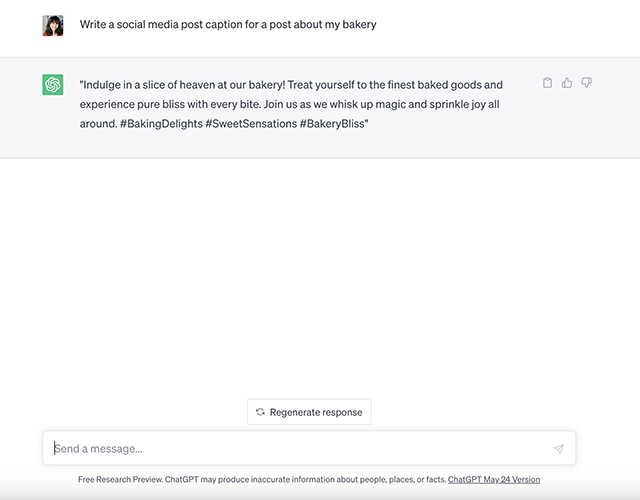
Ask ChatGPT to create your content with a single prompt. (Source: ChatGPT)
It’s not bad, per se. The caption is somehow persuasive, and you even get hashtags to post it with. But let’s compare it to the results from a more specific prompt:
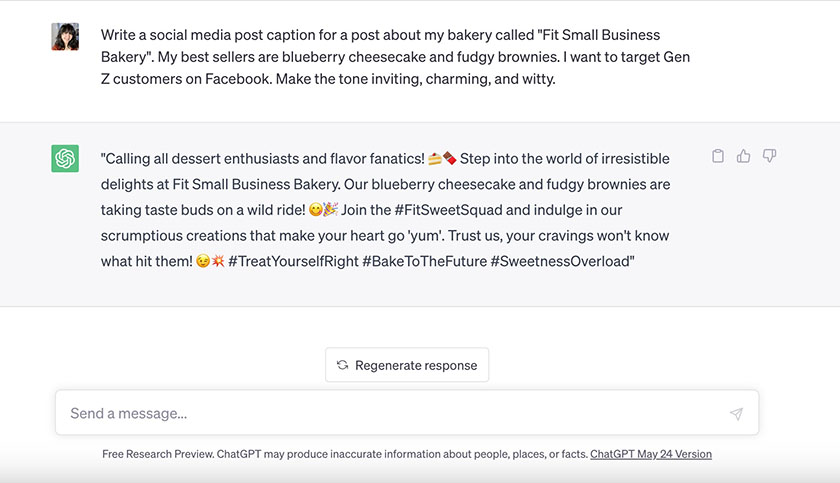
Make your content tailored to your business by giving more information. (Source: ChatGPT)
With the additional context, such as your business name, product highlights, brand voice and tone, and target audience, ChatGPT is able to take all of these into account and customize the caption for better user engagement.
Try This:
Don’t know how to write prompts that can create a great copy? Use my tried-and-tested template below:
“You are a (social media marketer/content writer/other roles) for (business name), a (business description). Craft a (content piece) targeting (your audience). Make it (three words to describe the content). Make sure to incorporate (your keywords, products, or other important information).”
3. Adjust Your Instructions (Try, Try Again)
There are times, especially when you are just starting out, when you don’t get the copy you expected on your first try. Don’t let this discourage you—it is completely normal. Adjust the information or settings accordingly until your AI tool generates the copy you’re happy with.
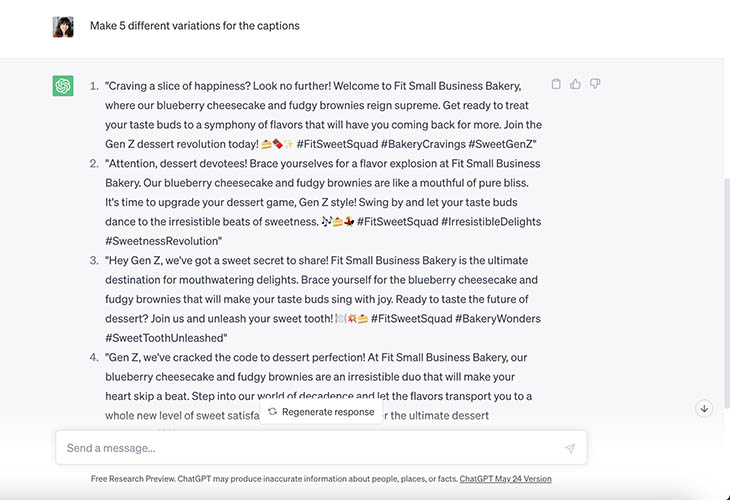
Ask for multiple versions of your content so you have options to choose from. (Source: ChatGPT)
Try This:
If you’re using ChatGPT, add a prompt asking for more variations of your content. This can help you choose the best one. If you’re using a different tool that doesn’t use prompts, you can usually enable variations under settings.
4. Manually Refine Your Content
Now that you’ve got your content, it’s time to make sure that it meets your business standards. Tweak the wording, adjust the structure a little bit, and edit it normally as you would a piece of content written by a human writer. Make sure to incorporate your creativity and add a dash of authenticity to keep your content fresh and engaging.
Google has AI detection in place, so the best practice is to always add your voice and original thoughts to ensure it doesn’t get flagged. AI-generated content, especially generic ones, can hurt your search engine optimization (SEO) efforts. These can be seen as plagiarized and unoriginal content. If unrefined, it can also be seen as low-quality content by Google.
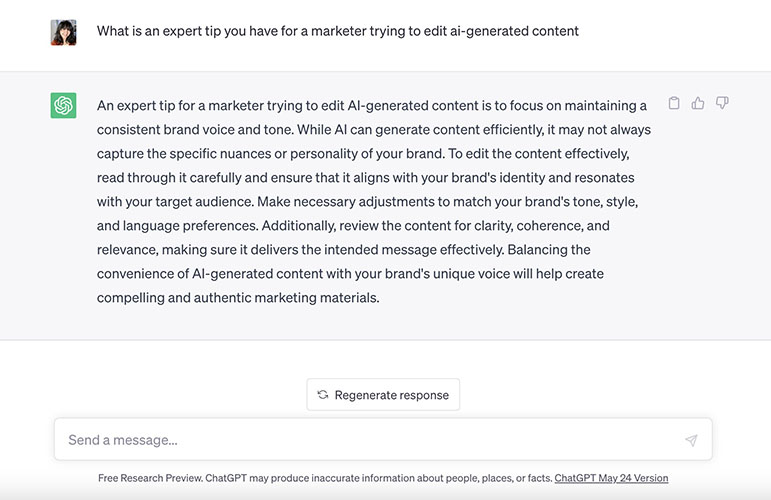
An AI-generated tip is to make sure your content is consistent with your brand identity. (Source: ChatGPT)
Pro tip: This step relies on you and not the AI tool, so our expert tip is a bit cliche: Do your best. No one knows your business and how your business should sound like more than you. If you’re looking for a more concrete tip, we asked ChatGPT for its own expert tip!
How to Leverage AI in Content Marketing (+ Examples)
The types of content you can create with AI include meta information, email copy, outlines, long-form content, captions, and assets like images or videos. You can also use AI tools to help in scoring and assessing your content to help in optimization. Artificial intelligence tools can even be used to distribute your content more efficiently.
Meta information includes the page title, meta descriptions, and more that search engines use to interpret the information on the website. Plenty of AI writing tools have features for generating title tags and meta descriptions, like Growth Bar and Frase IO. AI-generated meta information is concise and usually summarizes the content well—which is good for search engine optimization (SEO) in the long run.
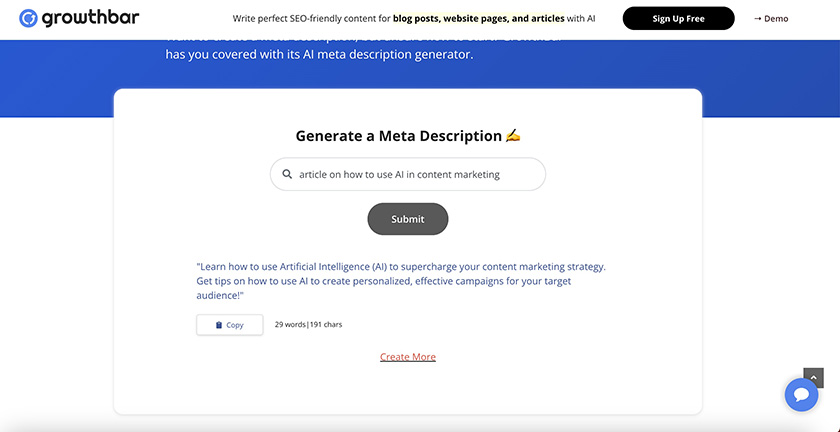
Use AI-based content creation for concise meta information. (Source: GrowthBar)
There are AI content creation tools specifically developed to generate copy for marketing and sales emails. These assist in crafting compelling email copy with an engaging subject line and personalized content. If used correctly, AI-generated emails can increase your email open rates.
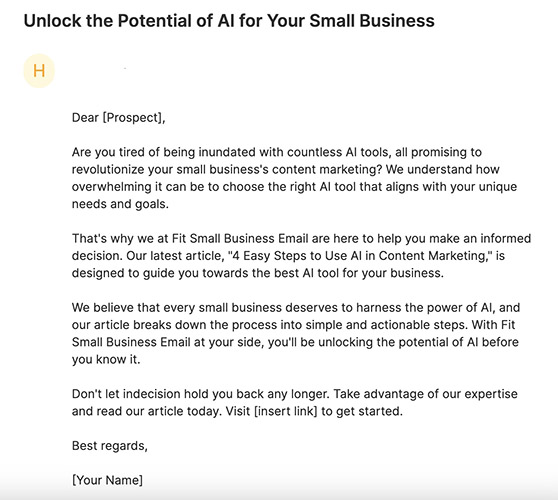
Smart Copy by Unbounce can create professional and persuasive emails.
(Source: Smart Copy)
Since artificial intelligence is particularly skilled at approaching information with logic and structure, AI content creation tools can make excellent briefs and outlines. By simply providing the topic, the AI tool can identify key points and structure your content.
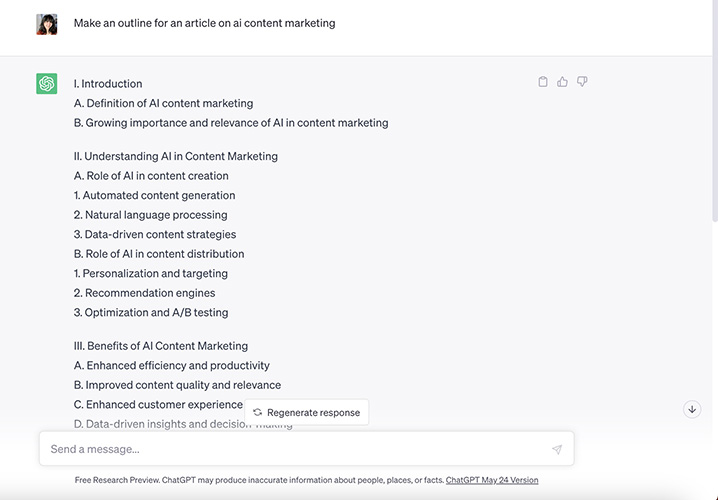
ChatGPT can make comprehensive outlines from simple prompts. (Source: ChatGPT)
Long-form content includes blog posts, whitepapers, case studies, or any type of content that takes hours to write. Powered-up AI tools like Writesonic specialize in crafting long-form content that is professional and insightful in a matter of minutes.
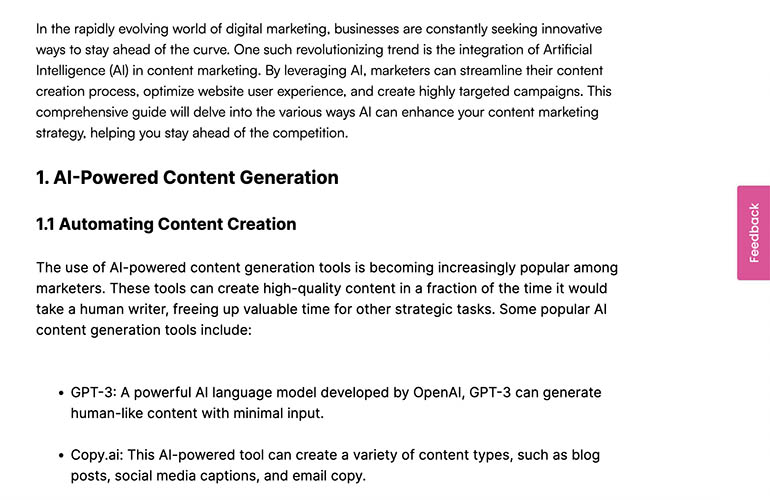
AI tools that are designed to create long-form content can handle large inputs of information.
(Source: Writesonic)
AI can now streamline visual content creation by automatically generating images, graphics, and videos based on specific inputs or templates. Canva, for example, rolled out a free text-to-image AI generator that works perfectly with their templates. And Photoshop recently rolled out an update called Content Aware Fill that will remove things you don’t want in photos and fill in what the background would be without that item.
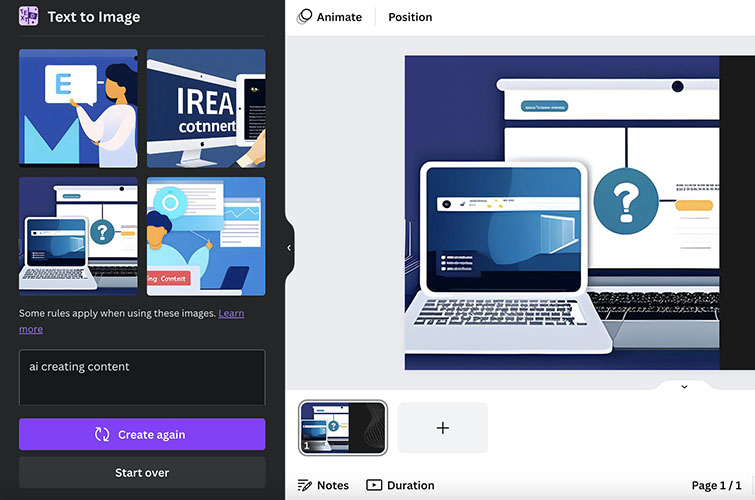
Canva’s text-to-image AI generator is free to use. (Source: Canva)
Did You Know? On top of content creation, there are other ways to use AI for small business marketing, like using chatbots or even making a business website.
Best Tools for AI Content Marketing
You’ve probably heard of at least a few AI-driven tools that can be used to grow brand presence online using content. You can even use AI in social media. To help you get started, we’ve narrowed down our favorite AI content marketing tools per content type.
Here are some of the most accessible AI content marketing tools for small businesses. Clicking on the links below will take you straight to the provider sites so you can get started right away:
- All-in-one solution for website, blog, and AI content writer: Wix
- Powerful content optimization tool powered by machine learning: Semrush
- Free AI chatbot for content briefs and outlines: ChatGPT
- AI blog writer and more with a generous free plan: Writesonic
- Data-oriented AI content assistant with real-time SEO insights: INK
- Solid library of AI email templates and generator with a free plan: Smart Copy
- Free meta description generator powered by GPT-4, a powerful AI model: GrowthBar
- Natural language AI for generating captions with free monthly credits: Copy.ai
- Completely free image-to-text AI generator in graphic design software: Canva
- Extensive content distribution platform with machine-driven automations: Sprout Social
AI can do so much more than just content marketing. You can create logos, graphics, even whole websites with AI. Find the tools you need to maximize AI’s contributions to your business with our guide to AI marketing tools.
Frequently Asked Questions
Google evaluates content based on its quality and relevance, regardless of whether it is AI-generated or human-generated. As long as AI-generated content meets Google’s guidelines and provides value to users, it can be accepted by Google. Just double-check your content because if AI-generated content misses the mark, it can be flagged as plagiarism or spam.
This depends on where you are. In the U.S., there are no laws protecting the work of AI or any non-human entities. On the other hand, AI-generated work can be protected by copyright in the UK if there is no human author to credit for the work.
AI can be beneficial for SEO if used to analyze and optimize content. It can also help in developing SEO content marketing plans. AI tools can assist in keyword research, helping to improve search engine rankings and drive organic traffic. However, if marketers use generic AI-generated content without human editing, it can instead harm their SEO efforts.
Many small businesses outsource the creation of written content, images, infographics, videos and more to content marketing service providers like Straight North and SEO Discovery. Others get occasional help through freelance marketplaces like Fiverr and UpWork.
Bottom Line
AI content marketing can be integrated from content creation up to its distribution. With the right techniques, businesses can use AI to streamline their content marketing process to create more relevant content at a much lower cost. Just the fact that you can generate content in seconds is enough for hundreds of thousands of marketers to get on board. But, to make sure your content doesn’t get lost in the influx of AI-generated content, learn how to use these AI tools effectively.
AI can take on the role of a social media copywriter, and none would be the wiser. AI uses data analysis and machine learning to find out trending hashtags, optimize the caption character count, and generally craft attention-grabbing captions.
Copy.ai creates conversational social media captions that mimic human writing. (Source: Copy.ai)